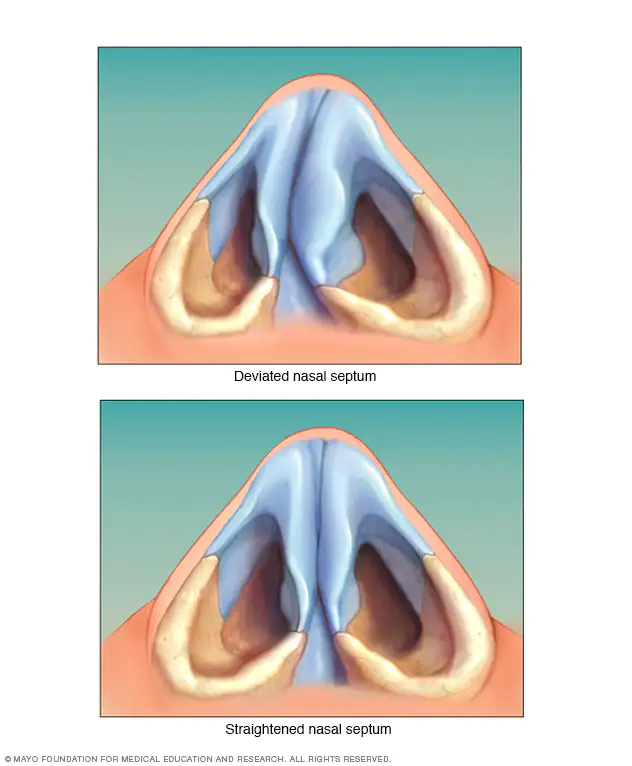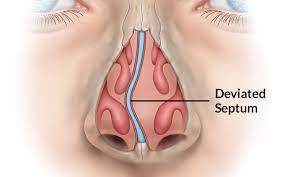A deviated septum results when the cartilage and bone separate the nasal cavity from the center. It is usually pre-birth, but in some cases, it develops with time for various reasons. A nose injury can also result in a deviated septum. If it gets worse, one may experience breathing problems, headaches, and nasal congestion.

What are the Symptoms of a Deviated Septum?
Difficulty in breathing is the most common symptom of a badly deviated septum. This is due to the blockage that occurs through nose deviation on one side. However, it is usually severe on one side.
A person with this condition may experience these symptoms:
- Sinus infections
- Increased nasal and respiratory diseases
- Noise breathing problems
- Breathing from the mouth because of nose blockage
- Nose bleeding
What Causes a Deviated Septum?
A deviated septum may be present since birth or may develop due to connective tissue disorder. It refers to abnormal development. The septum grows with the nose and most often grows towards each side. This is one of the most common reasons this condition can become infected.
In some cases, people with satisfactory or abnormal growth and development can have a deviated septum. It can also affect people who have not encountered any nose injury since birth.
ENT specialists suggest that nasal injuries can cause severely deviated septums, and surgery is the only option to treat such a severe disease.
How Can You Diagnose It?
A physical exam with a closer look at your nose will help the ENT specialists in diagnosing the exact situation. Not just outside, but an inside examination of the nose of an infected person helps to more exactly diagnose deviated septum.
How to Treat a Deviated Septum?
Many people do not require any treatment related to a deviated septum, as they show no symptoms. Others will have symptoms that are mild enough that they don’t affect their appearance or require treatment.
For people who have the condition or injury, most will go through treatment, commonly termed Septoplasty. It is the best treatment a person affected with a deviated septum can get, which results in a lifetime solution for breathing problems, sinusitis, and other nasal disease.

But Septoplasty has some limitations, and it is only for those patients whose condition is severe. Your ENT specialist is the person who will decide whether Septoplasty is needed or not. Some of the things that ENT specialists evaluate when you visit them.
- The septum condition
- Age of the person
- Health
- Surgical record, if any
- Drug allergies
- Nasal and respiratory tract analysis
- Ask you about smoking or any drug intake.
These things will decide if a person needs Septoplasty or if it can be treated with regular medications.
Prevention
Those born with a deviated septum have no chance to prevent it or get it treated without surgery. But for those not born with one, you can reduce the risk by following these steps. All you need to do is to protect your nose from:
- Any nose fall during sports activities
- Continuous use of face masks and helmets
- Bending your nose every time.
- Avoid being hit on your nose
- Protect yourself from nasal and respiratory diseases.
- Take anti allergies with a doctor’s prescription if you have an early age nasal disease.
Consult the Best ENT Specialist in NYC
Dr. Michael C. Burnett at Ear, Nose & Throat of New York has the best treatment options for a deviated septum, whether it is since birth or developed with age.
Call us today for more details or visit our website to book an appointment now.
EAR, NOSE & THROAT OF NEW YORK
Dr. Michael Burnett
115 East 57th Street
Suite 600
New York, NY 10022
212-867-4813
Contact







